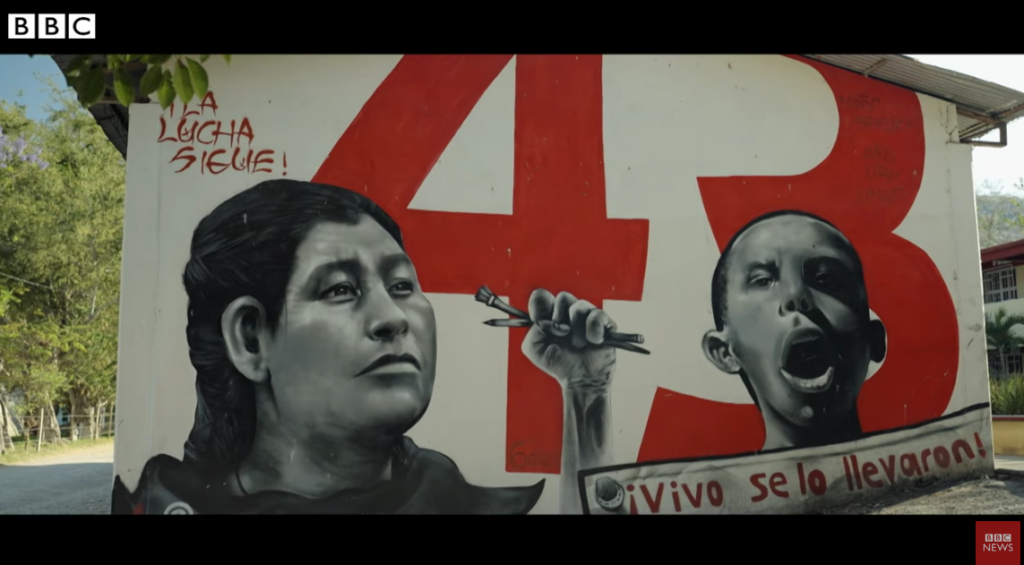
Luis Hernández Navarro
In front of the camera, in the Nahua village of Alpuyecancingo, Guerrero, Doña Cristina Bautista, mother of Benjamín Ascencio Bautista, one of the 43 missing Ayotzinapa students, says of the historical truth: “They were wrong about us. Even though we are peasants, we love our children. We are not going to accept what the government says.”
She is one of the voices heard in the recently released BBC documentary entitled Ayotzinapa: The Night 43 Students Disappeared in Mexico. Divided into four chapters, so far two have been released on social media (https:// rb.gy/3w1lrx and https://rb.gy/9fu5gy).
It is not the only one, but it is the most recent. The Ayotzinapa tragedy has inspired a large number of television reports and documentaries that narrate how it was possible that 43 young people from the Raúl Isidro Burgos rural teacher training college disappeared with impunity. The BBC material is part of an extensive production on this subject. Among other film chronicles, the following stand out: Ayotzinapa, crónica de un crimen de Estado (Ayotzinapa, chronicle of a crime of the State), by noted filmmaker Xavier Robles; Vivos (Alive), by Chinese artist Ai Weiwei; Ayotzinapa, el paso de la tortuga (Ayotzinapa, the pace of the tortoise), by Enrique García; Los días de Ayotzinapa (The days of Ayotzinapa), by Netflix; Un día en Ayotzinapa 43, una noche sin amanecer (A day in Ayotzinapa 43, a night without dawn), by Rafael Rangel; Mirar morir (Watching die). El Ejército en la noche de Iguala (The Army in the night of Iguala); The Missing 43: Mexico’s Disappeared Students, from Vice News; and 24 horas en Ayotzinapa (from early November 2014), from TeleSur, hacked in its Spanish version and pirated in the informal CD trade (https:// rb.gy/pzabej).
Speaking to the BBC, Doña Cristina recalls how she celebrates her son Benjamin’s birthday. She is a tireless fighter. When he and his two sisters were young, she left them in the care of her father-in-law and migrated to the United States in search of a livelihood. She returned when hhe was two years old only to leave again to get the money to get by. Four years later she returned.
In the television piece, the now democratic teacher Ulises Martínez, a former Ayotzinapa student and survivor of the massacre, also gives his version of events. In Ayotzinapa -he warns- “they teach us to think and to awaken our conscience”. There he reaffirms what he has testified in other conversations (https:// rb.gy/aufdrg).
In addition to Doña Cristina, the first two installments of Ayotzinapa: The Night 43 Students Disappeared in Mexico feature an interview with writer John Gibler, a great knower of Mexico from below, author of one of the best books on the subject, An Oral History of Infamy: The Attacks against the Normalistas of Ayotzinapa, and of a fundamental and controversial interview with the former prosecutor of the case, Omar Gómez Trejo: “How the Government Dynamited the Ayotzinapa Case Investigation” (https://rb.gy/bhfwjw).
The former director of the Criminal Investigation Agency (AIC), fugitive and refugee in Israel, Tomás Zerón de Lucio, also speaks. In spite of the evidence against him, he alleges to the British public television station: “I was head of the AIC, I had no need to torture anyone.” According to him: “I became too important to be guilty. But not so important that someone would come to my defense.” However, the evidence of his involvement in the torture of suspected culprits is irrefutable.
A key figure in dismantling the historical truth of the case is Mercedes Doretti. Founder of the Argentine Forensic Anthropology Team (EAAF), she narrates for the BBC the multiple inconsistencies and contradictions of the Mexican prosecution in the Cocula landfill. His account is devastating and terrifying.
The journalist José Manuel Jiménez explains how, on October 28, 2014, he recorded a video in the vicinity of the San Juan River, which exposes the unusual presence of Zerón, without the participation of the Public Prosecutor’s Office, next to the criminal Agustín García Reyes and several armed men. There it is evident that, without having constitutional powers for these proceedings, the intelligence official had control of the scene and the set-up.
In the first two parts of the documentary, Omar Gómez Trejo speaks. Also, Carlos Beristain and Ángela Buitrago, former members of the Interdisciplinary Group of Independent Experts (GIEI). The group emerged as part of the precautionary measure 409/2014, at the request of the parents of the disappeared. It formalized the agreement between the Inter-American Commission on Human Rights (IACHR), the representatives of the victims and the Mexican State, dated November 18, 2014, to provide technical assistance in the search for the 43; investigations and actions to be taken to punish those responsible and provide assistance to the relatives.
In September 2018, President-elect Andrés Manuel López Obrador made a commitment to relatives of the 43 normalistas to get to the bottom of the students’ disappearance. He promised a special commission, to issue a presidential decree and to bring experts from the UN and the Inter-American Commission on Human Rights (IACHR) to Mexico. In 2019, the government asked the IACHR again for the assistance of the GIEI. On May 7, 2020, the Mexican State and the IACHR signed an agreement for it to return to the country to provide technical assistance.
In addition to the BBC documentary, the HBO channel is preparing another one on this subject for the tenth anniversary of the disappearance of the young people. Meanwhile, this Monday, the relatives began another cycle of mobilizations.
Films, TV documentaries, books, reports and mobilizations, national and international, give an account of the deep social fabric woven to clarify the truth of the Ayotzinapa case. Even if the Army tries to block and/or sabotage the investigations, they will not stop. As Cristina Bautista reminds us, the parents of the disappeared, true civic heroes of our last decade, will not allow it.
Original text published in La Jornada on February 27th, 2024.
English translation by Schools for Chiapas.
